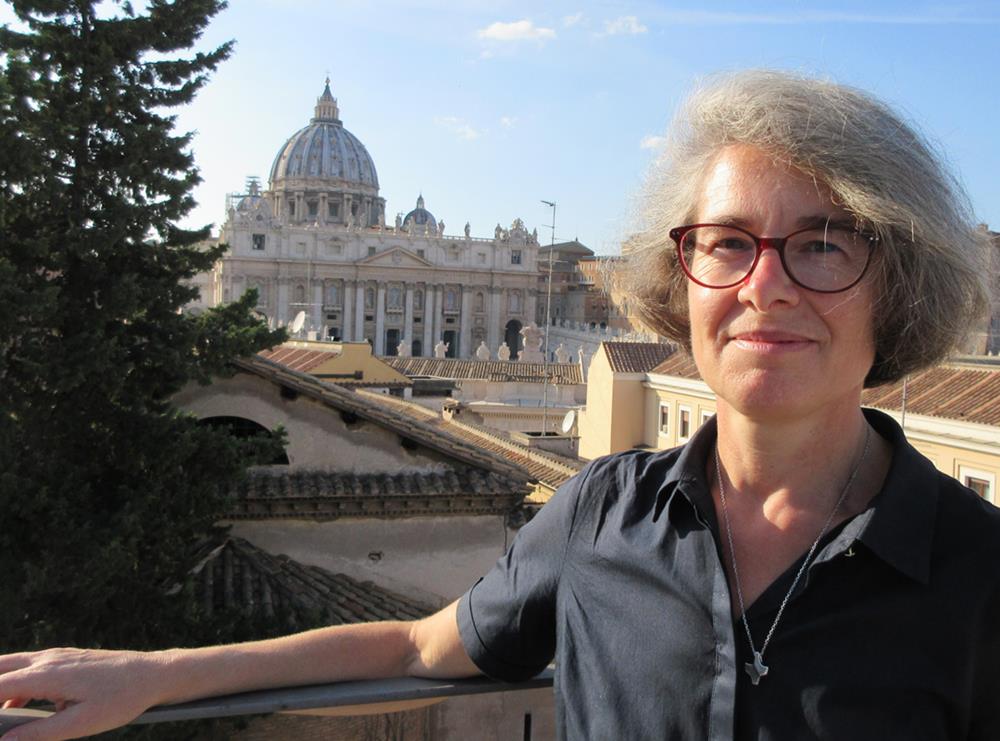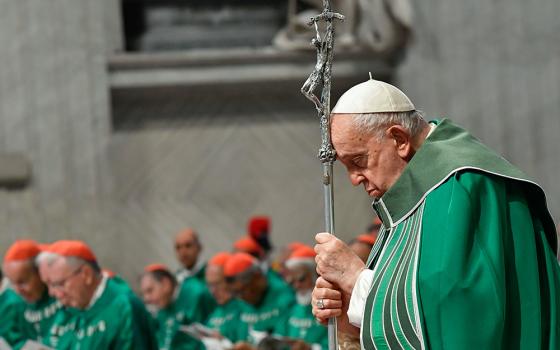
Sr. Nathalie Becquart, a member of the Xavière Sisters in France, is one of the two new undersecretaries for the Vatican's office of the Synod of Bishops, appointed Feb. 6 by Pope Francis. (Courtesy of Nathalie Becquart)
Sr. Nathalie Becquart, a member of the Xavière Sisters in France, is one of the two new undersecretaries for the Vatican's office of the Synod of Bishops. Before becoming a sister, she studied economics and business and worked as a consultant in marketing and advertising.
Becquart played a large role in the preparation for the 2018 Synod of Bishops on young people. She was a coordinator of the pre-synod and a speaker and observer at the synod. From 2012 to 2018, she directed the national office for youth evangelization and vocations at the French bishops' conference.
Until her nomination as an undersecretary in February, she was a consultor to the General Secretariat for the Synod of Bishops, headed by Cardinal Mario Grech from Malta, since September 2020. The other undersecretary is a Spanish Augustinian priest, Fr. Luis Marín de San Martín, who was made a bishop on April 11 in Madrid.
The three of them are to prepare the October 2022 Synod of Bishops, which will have the theme: "For a synodal Church: communion, participation and mission." In other words, how to repair the church, an institution in crisis, torn by divisions, scandals and doubts.
GSR: What kind of signal does your nomination send to religious women all over the world?
Becquart: When I read the many messages I received from all sorts of people — men, women, religious, laypeople — after my appointment, I was very touched. I realized that many sisters received it for themselves. I was struck by the impact my appointment had because it resonates with the aspirations of many people, women and men, around the world.
I think the fact that the two undersecretaries, Bishop Marín and I, both belong to religious orders shows the importance of what the experience of religious life can bring to the church. Our experience of community life, spirituality, community discernment and chapter life can bring something specific to the whole church in its quest for synodality. "Synodality" means "discerning together." It supposes spirituality, dialogue and listening.
Religious men and women have this experience of community life and spiritual life, and we also have the experience of the mission in our life of service to the poorest of the people. This could help define how to be a missionary church. Synodality is always missionary.
My appointment can be read on three different levels: I am a nun, a woman and a layperson. I see it as a sign the synod will want to listen to the people of God.
My appointment can be read on three different levels: I am a nun, a woman and a layperson. I see it as a sign the synod will want to listen to the people of God.
Do you consider it important that a woman has been appointed to a position of power in the church?
It is not the first time a woman has been appointed to an important post at the Vatican: More and more women, not all religious, are given important positions. My own nomination was made possible by other women before me. I feel like a small link in a chain.
What is new is that my current position includes the right to vote [at the synod]. It gives it a form of visibility. It is not an isolated sign; it is a sign of continuity. It makes visible the fact that women are already in positions of responsibility in many local churches. In my different positions, I have held responsibilities in the church of France. I feel I can only do my job well if I am connected to people on the ground.
How concretely will you prepare the synod?
It is a whole process, rather structured with different steps. At the Secretariat, we work with a team of about 15 people. We also consult with experts, and an important current task is to produce a preparatory document that will be sent for consultation to local churches.
Everybody is invited to participate in the preparation of this event. The church is very diverse and decentralized. We cannot be sure that everybody will join in, but we want to encourage parishes, dioceses, bishops' conferences, all the different ecclesial bodies to embrace a synodal style. The fact that the pope says something is not enough for the whole world to follow. Our challenge is to promote synodality, a change in the way the church operates. All of this takes time.
Advertisement
What is the difference between collegiality and synodality?
In a technical sense, collegiality is for the bishops. The First Vatican Council emphasized the primacy of the pope, with the view that the bishops received their authority from the pope and have to approve what the pontiff decided. The church was conceived very hierarchical. The Second Vatican Council debated a lot this question of collegiality and concluded that the pope was not separate from the college of apostles and that power could be exercised together by the pope and the bishops.
Synodality, in today's sense as emphasized by Pope Francis, who is calling for a synodal church, means that the whole people of God, who, by their baptism, are called to be actors, are to participate in discernment.
Yes, the challenge is now to see pastors not separated from their people. Vatican II has made things move, has rediscovered the vision of Christians from the first centuries, when the governance of the church was synodal and collegial.
Synodality is a fruit of the Second Vatican Council, a kind of rediscovery of a way of seeing the church first as people of God, people journeying together as pilgrims. What is complicated in the present situation is that we are in a transition phase, with two ecclesiologies that are colliding.
On one hand, we inherit from more than 1,500 years a hierarchical, clerical church where the clerics are separated from the laity. On the other hand, we can imagine a synodal church as described by the Second Vatican Council but which has not yet been received and implemented.
The situation of the church in the world is very varied, very contrasted. It is necessary to look beyond one's own parish. Several currents and sensitivities coexist within the Catholic Church. A majority of laypeople, including women, aspire to see a synodal church, but there is also some resistance from others.
Synodality means that the whole people of God, who, by their baptism, are called to be actors, are to participate in discernment.
Will there be more laypeople invited to the next synod?
We will see! Synods evolve from synod to synod. There are several synodal instances; the one of the bishops remains a synod of the bishops.
What is new is the emphasis given today in the new apostolic constitution Episcopalis Communio, promulgated before the 2018 synod for young people. This text insists that the synod is not only the monthlong meeting with the bishops, but a whole process: There is an important preparatory phase at the local level, and then, after the synod, implementing the decisions is also a decisive phase.
We hope that the preparation of the synod encourages the people of God to take part in preparatory meetings, to discuss, to listen. This really is what the text says and what the pope would like to encourage.
Religious communities should be very involved in preparations of this synod. It is important to listen to women, to young people, to poor people who do not always have a say.
Is the implementation of a synodal church the great project of Pope Francis' pontificate?
Yes, we can say that. Pope Francis was elected to advance the reform of the church. In a major speech to mark the 50th anniversary of synods, in October 2015, Pope Francis said, "It is precisely this path of synodality which God expects of the church of the third millennium." The synod could help us turn a clerical church into a synodal church.
In this time of crisis within the church, with all sorts of abuses and challenges, it is necessary to involve the laity in this vision of the synodal church.
I am convinced that the conversion of the church to the mission is a very important issue. We'll find a way out of this crisis only if laypeople are involved. If we want to implement the ecological conversion that Laudato Si' calls for and the fraternal world described in Fratelli Tutti, the church has to be synodal.
To me, the challenge is to work as a team. Nobody can solve a crisis alone. It is true that the church is structured with a hierarchical principle that means the priest takes the final responsibility after discussion with others. Of course, someone should be in charge, and often, it is the priest. But if the discussion has been serious and real, the opinion of the priest is not necessarily the one that will prevail.
In the book you wrote with four other Xavière sisters, you explain that the current COVID-19 crisis has made even more necessary a transformation of the church. How?
The crisis that erupted in a world that was changing fast has increased our feeling of interdependence. We realize that in a situation that is constantly changing, with safety measures evolving all the time, we have to become a church in movement, a marching church, listening to the Holy Spirit to discern every day how we can accomplish our mission.
The church must be a safe place for all. It has now to admit it is fragile and to change the way power is exercised in order to get back some credibility.
Many members of the church would like to be part of the process of decision-making in the church. This is something young people and women, in particular, demand now. They feel their voice is not heard enough.
The word "synod" comes from a Greek expression and means "to be together on the road." A synodal church is a place where everyone — laypeople, clergy, religious men and women, and the bishop of Rome — walks together.
The reform of the church is even more necessary because of the religious and sexual abuses that have been uncovered recently. The church must be a safe place for all. It has now to admit it is fragile and to change the way power is exercised in order to get back some credibility.
As a religious woman yourself, do you have a specific message for all the sisters in the world?
Religious communities have to take their part in preparing the 2022 synod.
For the first time, the International Union of Superiors General is named in the new constitution on the synod, Episcopalis Communio, as the actor for the consultation process through female religious orders. Everyone should be involved in this event and contribute to turn a clerical church into a synodal church.







